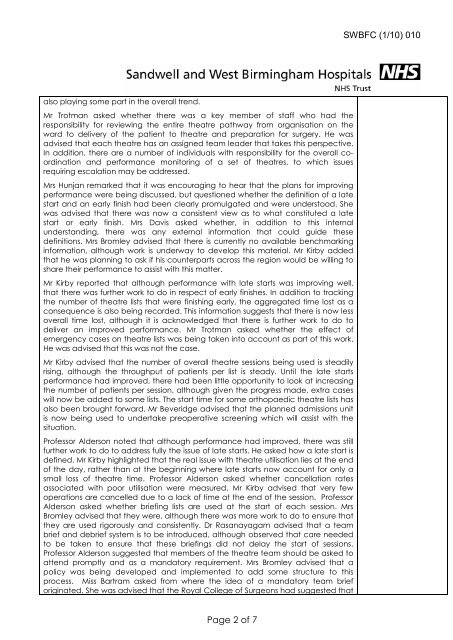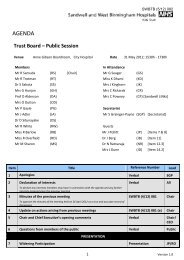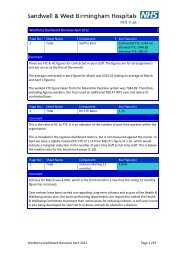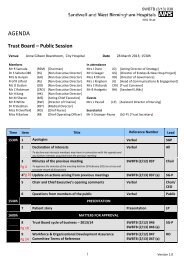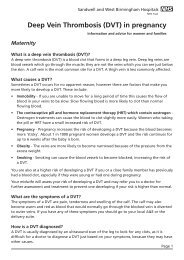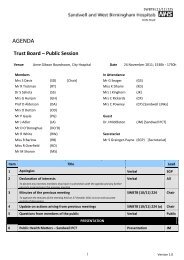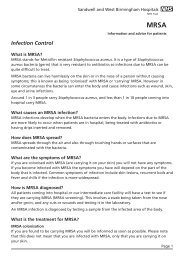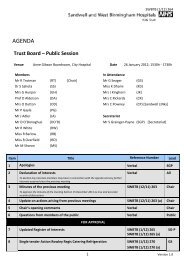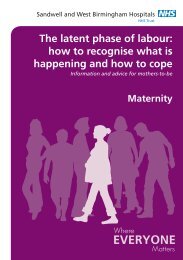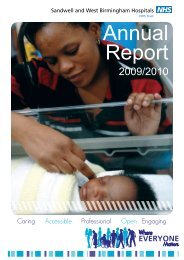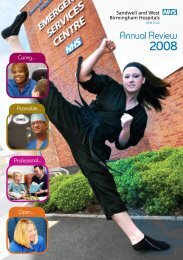Trust Board Febuary 2010 - Sandwell & West Birmingham Hospitals
Trust Board Febuary 2010 - Sandwell & West Birmingham Hospitals
Trust Board Febuary 2010 - Sandwell & West Birmingham Hospitals
You also want an ePaper? Increase the reach of your titles
YUMPU automatically turns print PDFs into web optimized ePapers that Google loves.
SWBFC (1/10) 010<br />
also playing some part in the overall trend.<br />
Mr Trotman asked whether there was a key member of staff who had the<br />
responsibility for reviewing the entire theatre pathway from organisation on the<br />
ward to delivery of the patient to theatre and preparation for surgery. He was<br />
advised that each theatre has an assigned team leader that takes this perspective.<br />
In addition, there are a number of individuals with responsibility for the overall coordination<br />
and performance monitoring of a set of theatres, to which issues<br />
requiring escalation may be addressed.<br />
Mrs Hunjan remarked that it was encouraging to hear that the plans for improving<br />
performance were being discussed, but questioned whether the definition of a late<br />
start and an early finish had been clearly promulgated and were understood. She<br />
was advised that there was now a consistent view as to what constituted a late<br />
start or early finish. Mrs Davis asked whether, in addition to this internal<br />
understanding, there was any external information that could guide these<br />
definitions. Mrs Bromley advised that there is currently no available benchmarking<br />
information, although work is underway to develop this material. Mr Kirby added<br />
that he was planning to ask if his counterparts across the region would be willing to<br />
share their performance to assist with this matter.<br />
Mr Kirby reported that although performance with late starts was improving well,<br />
that there was further work to do in respect of early finishes. In addition to tracking<br />
the number of theatre lists that were finishing early, the aggregated time lost as a<br />
consequence is also being recorded. This information suggests that there is now less<br />
overall time lost, although it is acknowledged that there is further work to do to<br />
deliver an improved performance. Mr Trotman asked whether the effect of<br />
emergency cases on theatre lists was being taken into account as part of this work.<br />
He was advised that this was not the case.<br />
Mr Kirby advised that the number of overall theatre sessions being used is steadily<br />
rising, although the throughput of patients per list is steady. Until the late starts<br />
performance had improved, there had been little opportunity to look at increasing<br />
the number of patients per session, although given the progress made, extra cases<br />
will now be added to some lists. The start time for some orthopaedic theatre lists has<br />
also been brought forward. Mr Beveridge advised that the planned admissions unit<br />
is now being used to undertake preoperative screening which will assist with the<br />
situation.<br />
Professor Alderson noted that although performance had improved, there was still<br />
further work to do to address fully the issue of late starts. He asked how a late start is<br />
defined. Mr Kirby highlighted that the real issue with theatre utilisation lies at the end<br />
of the day, rather than at the beginning where late starts now account for only a<br />
small loss of theatre time. Professor Alderson asked whether cancellation rates<br />
associated with poor utilisation were measured. Mr Kirby advised that very few<br />
operations are cancelled due to a lack of time at the end of the session. Professor<br />
Alderson asked whether briefing lists are used at the start of each session. Mrs<br />
Bromley advised that they were, although there was more work to do to ensure that<br />
they are used rigorously and consistently. Dr Rasanayagam advised that a team<br />
brief and debrief system is to be introduced, although observed that care needed<br />
to be taken to ensure that these briefings did not delay the start of sessions.<br />
Professor Alderson suggested that members of the theatre team should be asked to<br />
attend promptly and as a mandatory requirement. Mrs Bromley advised that a<br />
policy was being developed and implemented to add some structure to this<br />
process. Miss Bartram asked from where the idea of a mandatory team brief<br />
originated. She was advised that the Royal College of Surgeons had suggested that<br />
Page 2 of 7


